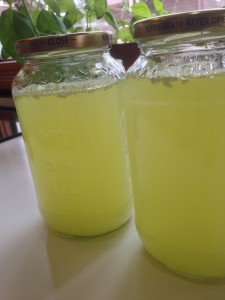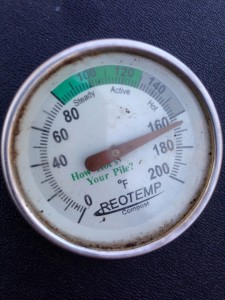I know the rules of what should and should not go into compost. I’ve written about it. I’ve spoken with hundreds of people about the rules in classes.
Still, I broke the rules, and now I’m paying the price.

Saved whey from a different batch.
I recently made a large batch of fresh ricotta cheese for lasagnas. It was delicious and simple. Once the curds formed, I was left with whey. Lots of whey. Probably about a half-gallon of whey.
The idea of pouring all of it down the sink felt wrong to me, but I didn’t know what else to do with it and with 20 dinner guests over the next two nights, I didn’t have time to research options, so I poured it all in the compost.
You may recall that dairy products, including but not limited to milk, yogurt and cheeses, shouldn’t go into your home compost if you want to avoid bad odors. You may have even heard me say that or read it on this very blog. Despite all that, I dumped it all into the pile.

Whey in the compost made it whey hot, and whey stinky.
No problem for a day or two, and I started to pat myself on the back for being such a good composter that I managed to avoid any and all odor problems by sheer skill and volume. Then things went bad.
On the plus side, the compost heated up, rapidly, and has now been over 150˚F for about two weeks straight. The down side is that it smells pretty bad. I mean it smells bad enough that I apologized to neighbors who might have caught a whiff of it. (They hadn’t.) It smells bad enough that I’ve been turning it at least twice daily, some days four times. It smells bad enough that I’ve added almost a garbage-bag full of shredded leaves.
Two weeks later and the smell is basically gone and the compost is still cooking away nicely. Lesson learned, even though we already knew it.
